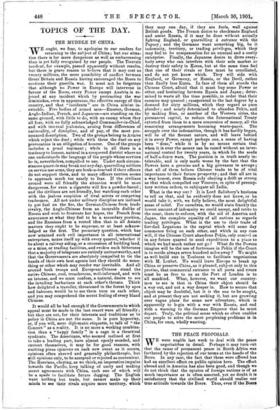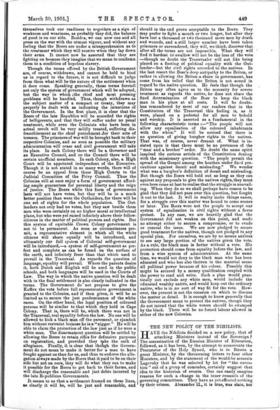THE PEACE PROPOSALS.
WE were unable last week to deal with the peace negotiatitms in detail. Perhaps it may turn out that the cause of permanent peace in South Africa was furthered by the rejection of, our terms at the hands of the Boers. In any case, the fact that these were offered has had an excellent effect on public opinion here. The effect abroad and in America has also been good, and though we do not think that the opinion of foreign nations is of as much importance as is often asserted, yet no doubt it is satisfactory that the civilised world should realise our true attitude towards the Boers. Thus, even if 'the Boers themselves took our readiness to negotiate as a sign of weakness and weariness, as probably they did, the balance of good is on our side. Besides, we can now one and all press on the war with the utmost vigour, and without any feeling that the Boers are under a misapprehension as to the treatment which they will receive when they lay down their arms. It cannot now be asserted that they are fighting on because they imagine that we mean to condemn them to a condition of hopeless slavery.
Though the terms offered by the British Government are, of course, withdrawn, and cannot be held to bind us in regard to the future, it is not difficult to judge from them what will be the nature of the settlement when it does come. Speaking generally, those terms foretell not only the system of government which will be adopted, but the way in which :the chief and most pressing problems will be handled. Thus, though withdrawn as the subject matter of a compact or treaty, they may properly be dealt with as indicating the intentions of the Government. In the first place, it is clear that the Boers of the late Republics will be accorded the rights of belligerents, and that they will suffer under no penal treatment, while even the Colonists who have been in actual revolt will be very mildly treated, suffering dis- franchisement as the chief punishment .for their acts of treason. The prisoners of war will be brought back to their respective Colonies, and as soon as possible the military administration will cease and civil government will take its place. In each Colony there will be a Governor and an Executive Council, and on the Council there will be certain unofficial members. In each Colony, also, a High Court will be appointed independent of the Executive. Though it is not stated in so many words, there will of course be an appeal from these High Courts to the Judicial Committee of the Privy Council. Thus the Colonies will at once enjoy a form of government afford- ing ample guarantees for personal liberty and the reign of justice. The Boers while this form of government lasts will not have votes, but they will be in a much better position than were the Outlanders, for there will be one set of rights for the whole population. The Out- landers not only had no votes, but they saw beside them men who were certainly on no higher moral or intellectual plane, but who were yet raised infinitely above their fellow. citizensin the matter of political powers and rights. But this system of equitable Crown Colony government is not to be permanent. As soon as circumstances per- mit, a representative element in which all the white citizens will share equally will be introduced, and ultimately our full system of Colonial self-government will be introduced,—a system of self-government as per- fect and complete as can be found on the surface of the earth, and infinitely freer than that which used to prevail in the Transvaal. As regards the question of language, equality will prevail. Where the parents desire it, both Dutch and English will be used in the public schools, and both languages will be used in the Courts of Law. The way in which the native question will be dealt with in the final settlement is also clearly indicated in the terms. The Government do' not propose to give the Kaffirs the vote before full representative government is granted to the Colonies, and if then given, it will be so limited as to secure the just predominance of the white races. On the other hand, the legal position of coloured persons will be similar to that which they hold in Cape Colony. That is, there will be, which there was not in the Transvaal, real equality before the law. No one will be allowed to kick a bla.ck,man off the pavement, or sjambok him without restraint because he is a "nigger." He will be able to claim the protection of the law just as if he were a white man. The disarmament question will be settled by allowing the Boers to retain rifles for defensive purposes on registration, and provided they tisk° the oath of allegiance. Finally, it is clear that thoTigh the Govern- ment do not mean to make it better for a man to have fought against us than for us, and thus to endorse the alle- gation always made by the Boers that it paid to be on their side but not on ours, they will do what they can to make it possible for the Boers to get back to their farms, and will discharge the reasonable and just debts incurred by the late Republican Governments.
It seems to us that a settlement framed on these lines, as clearly it will be, will be just and reasonable, and should in the end prove acceptable to the Boers. They may prefer to fight a-month or two longer, but after they have lost a thousand or two thousand more men by death and wounds, and a still larger number have been taken prisoners or surrendered, they will, we think, discover that after all the terms are not impossible. What they will find it hardest t6 swallow will not be the loss of the vote —though no doubt the Transvaaler will not like being placed on a footing of political equality with the Out- lander—but the civil rights accorded to the natives. In the last resort the Boer's deep antipathy to the Briton, or rather to allowing the Briton a share in government, has come from his belief that the Briton is not sound in regard to the native question. He feels that though the Briton may often agree as to the necessity for severe treatment as regards the native, he does not share the fixed determination of the Boer to keep the black man in his place at all costs. It will be doubt- less remembered by most of our readers that in the Constitution of the Transvaal this feeling is, as it were, placed on a pedestal for all men to behold and worship. It is asserted as a fundamental in the following characteristic terms :—" The people will not allow any equalisation of the coloured inhabitants with the white." It will be noticed that there is no question of giving burgher rights to the natives. That was, of course, never dreamt of. What is in- sisted upon is that there must be no pretences of the "man and a brother" order. No doubt the same spirit inspired the curious article of the Constitution dealing with the missionary question. "The people permit the spread of the Gospel among tire heathen under fixed pre- cautions against deceit' and misleading." We wonder what was a burgher's definition of deceit and misleading. But though the Boers will hold out as long as they can against any proposals to give the natives rights, they must even here come at last to realise that the struggle is unavail- ing. When they do so we shall perhaps have reason to be glad that they did not pass over this question, but fought it out to the last. It will in reality make things easier, for a struggle over this matter was bound to come sooner or later. The Boers were not the people to accept our system of equalisation in civil rights without a fierce protest. In any case, we are heartily glad that the Government did not weaken on this point, and made no attempt either to secure a compromise, or to evade or conceal the issue. We are now pledged to secure good treatment for the natives, though not pledged to any special plan. For ourselves, we are by no means anxious to see any large portion of the natives given the vote: As a rule, the black man is better without a vote. His protection should come from equality before the law, and from a wise system of administration. At the same time, we would not deny to the black man who has been educated and who has also thriven in the material sense all political power because of his colour. Possibly this might be secured by a money qualification coupled with the power to read and write. Such a plan would prac- tically Uot exclude any white men, would include the educated wealthy native, and would keep out the ordinary native, who is in no sort of way fit for the vote. How- ever, the present is not the occasion on which to discuss the matter in detail. It is enough to know generally that the Government mean to protect the natives, though they do not intend that the white voters should be swamped by the black. There will be no forced labour allowed in either of the new Colonies.







































 Previous page
Previous page